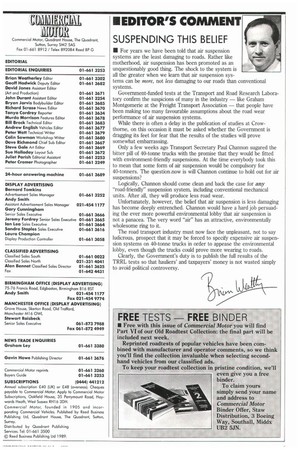IIEDITOR'S COMMENT
Page 5

If you've noticed an error in this article please click here to report it so we can fix it.
SUSPENDING THIS BELIEF
• For years we have been told that air suspension systems are the least damaging to roads. Rather like motherhood, air suspension has been promoted as an unquestionably good thing. The shock to the system is all the greater when we learn that air suspension systems can be more, not less damaging to our roads than conventional systems.
Government-funded tests at the Transport and Road Research Laboratory confirm the suspicions of many in the industry — like Graham Montgomerie at the Freight Transport Association — that people have been making too many favourable assumptions about the road wear performance of air suspension systems.
While there is often a delay in the publication of studies at Crowthorne, on this occasion it must be asked whether the Government is dragging its feet for fear that the results of the studies will prove somewhat embarrassing.
Only a few weeks ago Transport Secretary Paul Channon sugared the bitter pill of 40-tonne trucks with the promise that they would be fitted with environment-friendly suspensions. At the time everybody took this to mean that some form of air suspension would be compulsory for 40-tonners. The question now is will Channon continue to hold out for air suspensions?
Logically, Channon should come clean and back the case for any "road-friendly" suspension system, including conventional mechanical units. After all, they will produce less road wear.
Unfortunately, however, the belief that air suspension is less damaging has become deeply entrenched. Channon would have a hard job persuading the ever more powerful environmental lobby that air suspension is not a panacea. The very word "air" has an attractive, environmentally wholesome ring to it.
The road transport industry must now face the unpleasant, not to say ludicrous, prospect that it may be forced to specify expensive air suspension systems on 40-tonne trucks in order to appease the environmental lobby, even though the trucks could prove more wearing to roads.
Clearly, the Government's duty is to publish the full results of the TRRL tests so that hauliers' and taxpayers' money is not wasted simply to avoid political controversy.














































































































































































